Ep. 26: Mangasplaining Season One Recap Episode
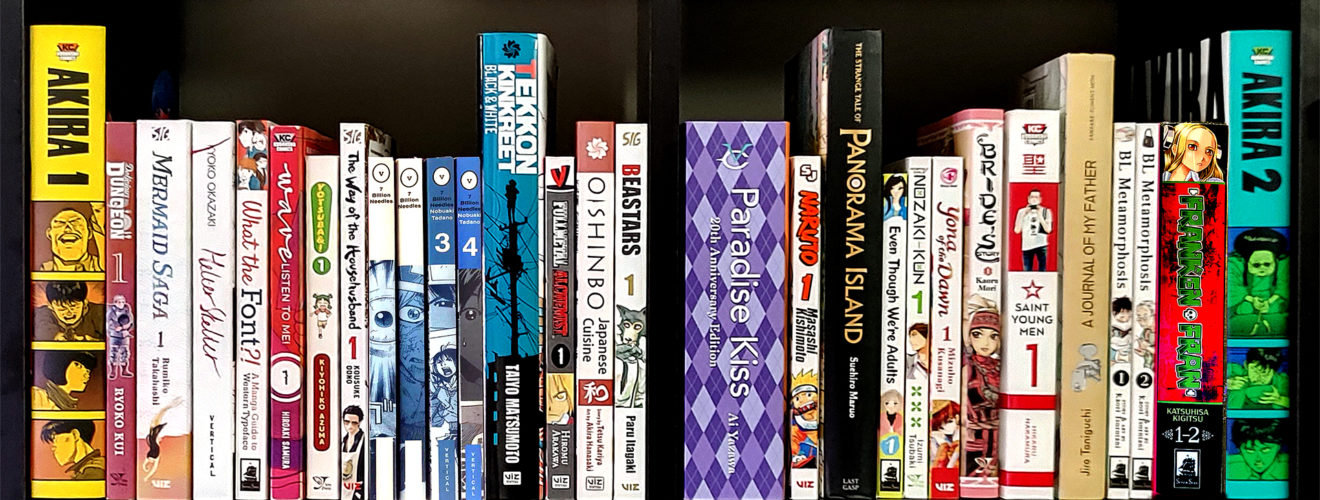
We did it folks, a full 25 episode first season of Mangasplaining! To celebrate, we’re looking back over the first 25 titles we covered, some of the important discussions (and not-so-important discussions) we had, and of course, the lessons we learned along the way. Spoilers, it was Friendship. After this episode we’re taking a few weeks off, and we’ll see you back at the beginning of September for Season 2!
Powered by RedCircle
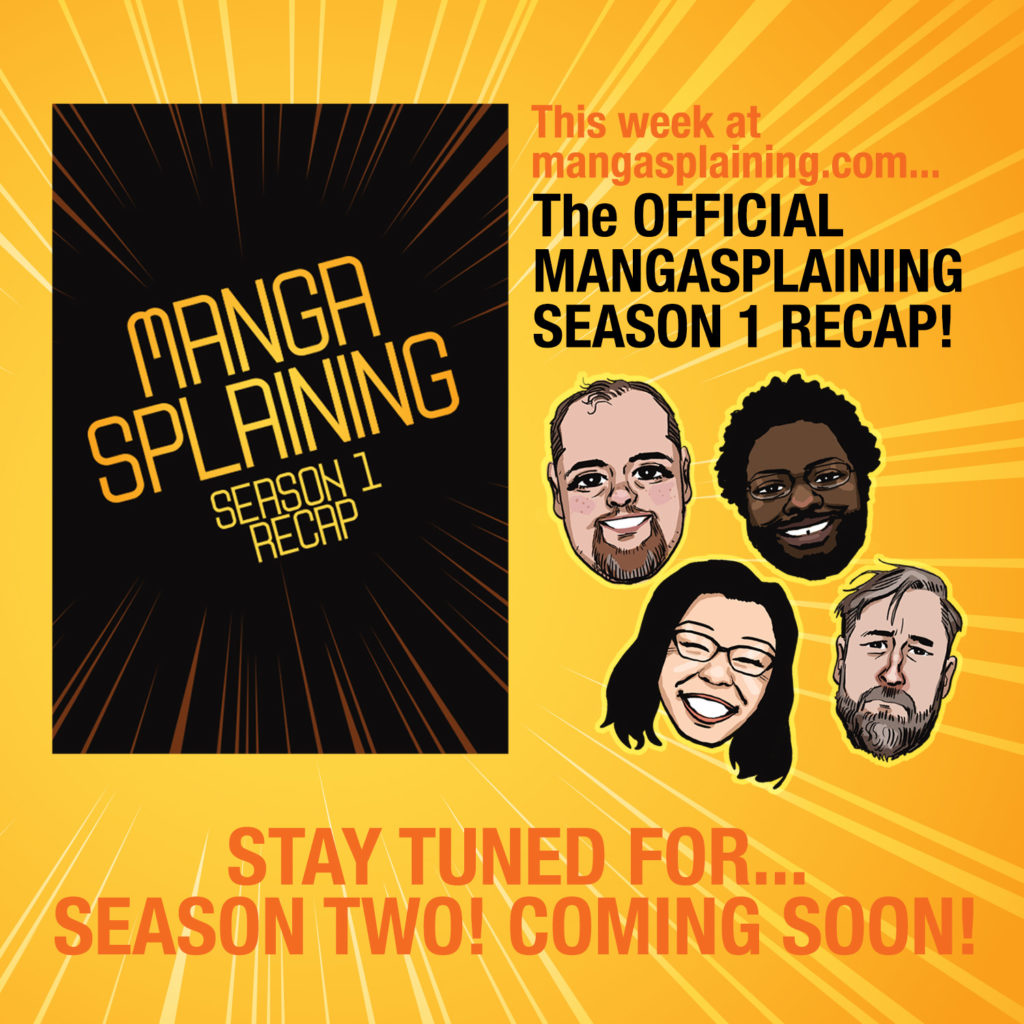
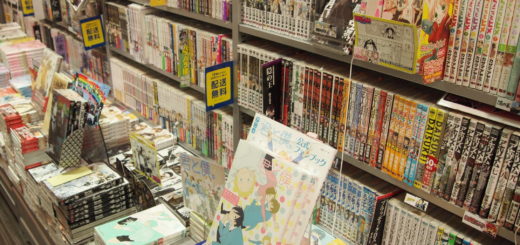
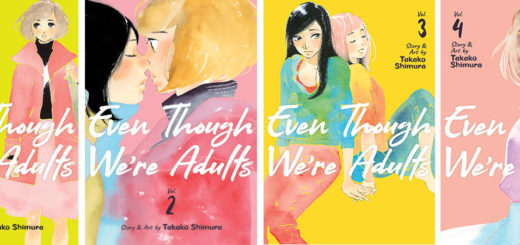
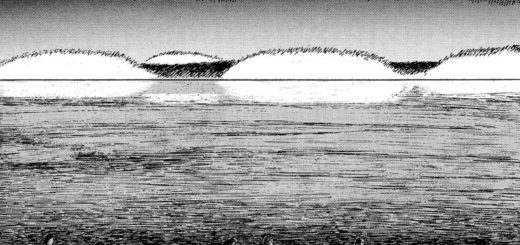
Congrats on 26 eps! Happy pod-a-versary. You all may not stop doing this ever. It’s the highlight of my week. ^_^
Re: Lettering and the letterers and translators.
I think that there’s several reasons why reviews and reviewers have failed to take technicals into account.
Until recently, publishers didn’t list positions like retouch, editor, pre-press, so readers had no idea *people did those things.* It’s only recently, with pressure from folks like the letterers themselves and reviewers like me, that companies are grudgingly admitting that manga is made by a lot of people.
Secondly, manga reviews back in the day were more like book reports. Few reviewers knew anything beyond reading a manga. Now that manga as an industry is developing and growing more people are beginning to treat it as an industry. And that means reviewers and journalists are, likewise, evolving. So many of us reviewing now have worked on these or other books and understand the kind of effort they take. I’ve done lettering and retouch and I tip my hat to those folks.
And lastly, folks doing these things are speaking up! That’s made such a huge difference that someone recently accused me online of being “that reviewer who refuses to credit letterers.” I don’t know who they meant, but I guess yay for the letterer whos ire at not getting credit in a review made an ally.
Cheers and here’s to the next 26.
Hi, never commented before but I love the show.
Your coverage of the manga is great and very informative.
As a French reader it is very fun to hear about the French market so frequently ^^ For Saint Young Men it was even a bit uncanny how the book was received in the US. I read it nearly a decade ago because my mom bought it after one of her coworker told her it was very funny. It was that mainstream and perceived so harmless that women in their 50s who never read manga before was a market for the book. Also in the french edition the jokes aren’t explained at all. Being neither Christian nor Buddhist I may have missed most of the jokes.
Ah thanks so much for your comment!
First up, congratulations! I’ve been a silent fan of Chris and Deb on their respective websites for many years, but this is your best work yet. I also finally finished listening to all the episodes. I held out on the count that there were a few titles I hadn’t read, and wanted to read them first before listening to the respective podcast.
In a sea of podcasts and youtube manga reviews, you guys are among my very top favorites. The reason is simple: you guys are sincere and I can hear your enthusiasm (or disgust) over these digital waves. Too many reviewers but especially those on youtube, are more interested revving up their own egos. These reviews are choke full of bad performance of ironic self-deprecation, so much so that the sometimes forget to talk about the materials, or more importantly, how it affected them. I don’t mind people hating or loving a piece of media, characters or art or story or what-not, as their opinions are all valid, but what I really enjoy is when the emotion is genuine and heartfelt. The medium of manga (and anime, lets be real) have a way of driving a 9-inch nail directly into my emotional core if the content is explosive, or worming a path into my psyche if it’s contemplative, that is decidedly different than most books or live action movies. And when I hear people describe their experience in similar veins, I feel as I’m reliving that initial impact vicariously a second time around even if their opinion is different than mine. While there is a place for highfalutin criticism stuffed with overly-ornate languages (as if I’m not doing that now), or super dense analytical breakdown as if you would a college thesis, if the emotion is genuine, I can still relate (may be that’s why I hate most movie or music critics, because, I just can’t relate). And to that end, you guys do that in spades. So Bravo!
I love Deb wanting to go into trash manga. Oh, PLEASE DO! Trash manga is one of the best reasons to read manga (or anything, music, movies, etc.). The trashier, the more politically incorrect, the more you want to categorically condemn the entire Japanese manga culture for its violent,misogyny,sexiest,racist,ignorant,cultish,sick,ridiculous,stupid,pandering,sale-out,offensive,counterculture,counterrevolution,eroguro, and otherwise illegal in the lower 48 including Alaska and the Virgin Islands (we’ll leave Hawaii since I lived there a few years) content, whole sale and carte blanche, the better (let me emphasize again, manga, not real). I just love how Chip reacted to Franken Fran, Saint Young Men, or Panorama Island. I just laughed. In fact, you should go look for stuff that really turns him off (man… if only you can include the non-published (ahem) titles including doujinshi…the manga world, not just in Japan but around the globe, is just too attractive for me.) I think the fact that you guys can have such a diversity of reaction is exactly what makes manga medium so powerful. Do look for something that would really chaff Chip’s (or each other’s) hide (get him to read Kago Shintarou).
But one criticism… no, not criticism… just disappointment, is that Chip stated that he doesn’t really read manga/ comics for enjoyment (I hope I’m not misinterpreting it). That, makes me sad. I do a lot of art work purely for love and my own sake (I don’t post or twitter or Facebook or youtube etc), but I often wonder if I do that as a job, would I come to hate it? I read that a lot of pro musicians, what they want to do when they go home after a gig, or on the weekend, is that they just want to go play the drums, or the guitar, all day long. I don’t know if it’s right for me to say this, and I apologize if not, but Chip, I hope you re-locate your joy of reading comics.
Wow, I wasn’t expecting a shout out, so thank you for that. This podcast the accompanying show notes have been source of pleasure for the past few months. I’m so glad you did a recap episode, because it allowed me to mentally revist all the great books I’ve read. I enjoyed you all coming back to your original thoughts and seeing if some distance from the work had changed your opinion of it.
I also can’t thank you enough for all the discussion you have about the actual publishing of manga, both inside and outside of Japan. I love the process talk as much as I do the discussion the works themselves engender.
David had a really good comment in this episode, and I’m probably going to mangle it here. He said, “Whether something’s good or bad is only the first sentence in the conversation,” which is a great way to think about media criticism.
Can’t wait for season 2!
Thanks for a great season of podcasts. We learned a lot and had some fun.
My faves were the Way of the Househusband, a Bride’s Story, Yotsuba& and A Journal of My Father, quite a range in tone and subject matter. Like Chip, I went all-in for Househusband, but since I prefer print over digital, I had to suffer through the great manga drought of 2021, waiting for the earlier volumes to reprint. I found myself incredibly charmed by every volume of Yotsuba&. It was a tough year and I really came to love those gentle moments.
Two questions/suggestions for future discussions:
1) Please consider a general overview of the historical progression of the manga industry. We always speak of the North American comics industry in terms of the Golden/Silver/Bronze Ages, and I wondered if the manga industry has similar distincitive eras of cultural and commercial change.
2) Are there any major manga published in colour? I understand that the industry is rooted in B&W magazine serialization, and that a colour section is occasionally used to introduce a new serial, but are there any manga published in colour either in first run or in reprinted trades? Is it simply a budgetary decision, or is it more a case of tradition? Is there any actual opposition to the idea of colour manga? It’s interesting to consider that all anime adaptations of manga are in colour.
The only real example of colour manga that I’ve come across is the Epic run of Akira. I’ve read both the B&W and the colour versions, and while I’m usually an originals purist, in this case I prefer to read the colour version. I imagine it might be because I grew up on the Epic run. (I would be curious to hear what Chip thinks of the colour version, I don’t think I could handle his rejection.)
My only suggestion for the podcast would be for a look at my sentimental favourite Lone Wolf & Cub, but I understand that it would be difficult to cover due to its many volumes and the generally episodic nature of the storyline in the first half or so of the series. Perhaps you could just watch Shogun Assassin!
Stephen: If you’re looking for full-colour manga, you could check out Cobra: The Psychogun by Buichi Terasawa. The first volume is free on BookWalker.